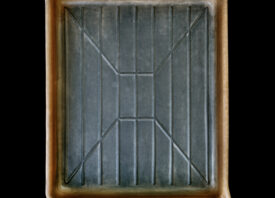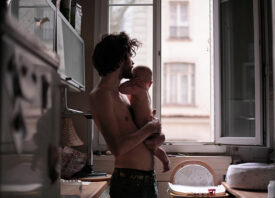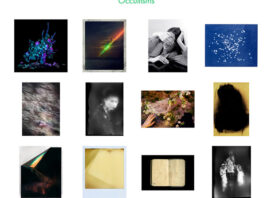Search this site
10 Photographers Reveal How They Respond to Criticism
Many believe that constructive criticism can be greatly beneficial; we learn from feedback of others and are thus able to better our artistic output. There is however that argument that artists should not allow themselves to be moulded by the opinions of others. Professional photographers are not immune to creative criticism, and yet they continue to produce work. Feature Shoot asked 10 photographers to reveal how they respond to creative criticism.

Image © Kazuma Obara, Japan, 2015 – from the series Exposure
Kazuma Obara
“Three months after starting my project about Chernobyl, there were many opportunities to have portfolio reviews in various countries in Europe. I brought along my handmade dummy book and showed my work and ideas to reviewers. The work was an ongoing project so I just wanted to get feedback about my idea. I met thirty people in total, and literally all reviewers told me something along the lines of “to be honest, this subject ‘Chernobyl’ is going to be really difficult to publish as a photo book. There are plenty of photo books already about chernobyl, it might work for a newspaper or a magazine but not for a book. So many great photographers already did the project from various perspectives and they already became books. Your work has to be really really really unique.” Some professionals even recommended I change the subject.
But changing the subject was not an option. And thanks to these conversations, I tried to present my work in an extremely unique way. This enabled my series Exposure to come first place in the ‘People’ category of the World Press Photo Contest 2016.”
Martin Parr
“I am going to pass on this, as I don’t want to flatter my critics by paying it much attention.”
Roger Ballen
“In my early career, I was harshly criticized for exploitation of my subject matter to the point where my dog Leroy was my only friend in Johannesburg. Over the past decade I have rarely been criticized as I seen by many seen as one of the more unique living contemporary photographers. I have always believed in my work and have stated that the key criteria to weathering criticism is whether one can live with oneself.”
Sohrab Hura
“Criticism is only as constructive as you make it to be. It is important that your priority lies in figuring out who you are and what you want to do with your photography. Only then will you be able to sift through, to find what aligns with your own ever-changing needs and reasons, the deluge of critiques and suggestions that is headed your way from all directions. In today’s world everyone is a critic, and if you don’t have at least an inkling of your own starting point then criticism that could have been wonderful might just turn into something more destructive. It would be good, especially for a young photographer, to pay attention to people who provide a layered opposition to your view point, who either challenge the position that you take by providing an alternative or reason why your work hasn’t yet achieved the objective it set out to achieve. They can help open up windows that you didn’t know existed and push your work further that you would have on your own. There will be many who will simply say they don’t agree with the work or you and nothing more. They are usually the loudest and talk the most and are more often than not photographers themselves. If you dig a bit further you will realize that they don’t have anything much to offer both in terms of their own work or viewpoint. These are the ones to ignore. Your time is far too precious and you are better off continuing to make more work.”
Antonio Olmos
“I became a photojournalist when film was the only option. As such everything I shot eventually led to a contact sheet. Before digital I always showed my contact sheets to the photo editor that commissioned the job. I expected and got a lot of constructive feedback. Also one of the joys of contact sheets was that when I picked them up from the lab I would invariably run into another photographer I knew and we would share each other’s work over a coffee. With the event of digital all that is gone. Now I edit the work myself and keep my mistakes and work process to myself. I miss the feedback I got from my colleagues and photo editors. I learned a lot from all that creative criticism as people poured over my contact sheets. I wouldn’t be anywhere without it.”
José Sarmento Matos
“You should believe in yourself, in the subjects you choose and in the way you feel and look at things. Many people will criticise your work in different ways. You will be given varying advice. And you should take on board everything in order to keep seeking and improving your own voice! For instance, when you are working on a long term project from the beginning to the end it´s worth talking to editors about it. Try to always get their constructive criticism, though you don´t need to follow every piece of advice literally.
“Ignore non-constructive criticism (either positive or negative), it won´t take you anywhere. Ask feedback from people you know that will be honest with you; those that go straight to the point trying to help you, even if they may be harsh with you!”

Comb, 2013, Image © Sohrab Hura
Yumna Al-Arashi
“Most criticism from viewers of your work is best left unheard and unread. Receiving compliments on social media is not positive criticism, although it may be easy to fall into that trap when you’re showcasing your work online every day. Respectively, your work shouldn’t change because of a negative response from a stranger online.
“The kind of criticism one should pay attention to comes from those you trust, look up to, or work with. Those whose opinion you truly value. Listen to your editors, listen to people who are successful in your field, listen to friends who have a good sense of art and creation. Spend time with your work, criticize yourself, and go through all the motions before you are ready to show to others whom you trust for a valued critique.”
Stuart Freedman
“In the social media age when everyone’s online images are ‘awesome’, real, useful and vital (constructive) criticism is very hard to find. I think it’s always wise to seek out someone whose work you admire and be open to suggestions. Criticism (and the taking of it) is a delicate thing: a fine line between encouragement and destruction. Good advice should resonate with perception and good intention but not pander to one’s ego. Sometimes it’s the really basic (and obvious) things that you haven’t thought about that engender positive change. Often we’re so wrapped up in the ‘how’ of doing things, we forget the ‘why’ we started doing them in the first place. Ultimately, constructive criticism is about a gentle guiding; putting you back on the straight and narrow. Overtly hostile and overly blunt criticism will likely come from a different place and you have to trust your instincts: photography’s a game of hard knocks and staying power. There’s a great deal to be said for bloody-mindedness. But a bloody-minded photographer that listens? That’s a good place to be.”
Diana Markosian
“When someone says your work is good, don’t believe them. Ask them why. It’s always easy to settle on good, but try to seek real input to improve your work. That’s how you’ll learn new ways of seeing and thinking.”

Matt and Fay, 2013, Image © Carlotta Cardana
Carlotta Cardana
“I think constructive criticism is hard to take, just like admitting you’ve made a mistake, but it’s usually much more helpful than approval or praise. It makes you question yourself and your work, see where/how you can improve, and hopefully you come out of it inspired to try out new things. Non-constructive criticism is the worst thing, a waste of time and potentially damaging to your mood, self-esteem and confidence. I only take note of feedback received from people I respect and who have understood my purposes; I also value it the same way, whether they are industry people or not, because I don’t want to do work for industry people only. However, I think your work should be a reflection of who you are, so at the end of the day I only listen to myself and my instincts because it’s the only way to keep my work personal and unique. After all, it’s all just a one man’s opinion, so I’d better stick to mine! This obviously doesn’t apply to client/commissioned work.”
Follow us on Instagram!



